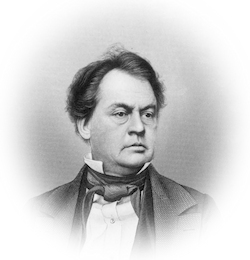Washington, D. C, May 16th, 1860.
Dear Stephens, I recd, your letter this morning and I find myself quite surprised that while we so nearly, I may say exactly, agree in principle that we differ so widely in action. I agree with you that [what] we ought to demand is to call upon our Northern allies to stand by their bargain ; but I complain of them that they will not do it. In the first place we [believed?] in non-intervention because we held it to be a fundamental principle of law that slavery existed in the territories without local laws, or to put the case wider that it existed everywhere where not forbidden by law. The Supreme Court have decided this case in our favour; but Mr. Douglas will not stand to it. The Illinois resolutions passed 4th Jany. by his friends expressly declare that it cannot go into the territories without positive legislation. Mr. Douglas under his own hand in his controversy with Black holds the same principle. He says you are out and can not get in except by positive law and nobody but squatters can pass that law. You very truly say we did not take non-intervention on these terms. 2ndly. We did agree to leave the question of the power of the people of the territories to the courts. You admit in your letter, and I agree with that, -it is decided that Congress has not the power to prohibit it itself and could not therefore give it to the people of the territories; but Mr. Douglas denies that and presses upon us, after the decision, for public acceptance the same doctrine and with tenfold the vigour that [he] ever did before the decision. He tenders the issue, he forces it on you, he will only take non-intervention with his exposition, and [comes?} with it in his hands, and if you leave it without exposition you accept him and his construction of it. You and I are called upon to accept non-intervention as expounded by Mr. Douglas against our own exposition, that of our people and the Supreme Court. Why shall we do this thing? I am willing to accept non-intervention as you expound it. I ask[ed] nothing more at Charleston; but I will not take Mr. Douglas’s exposition. Mr. Douglas in a very able speech delivered by him yesterday (he will continue it today) declares that non-intervention and squatter sovereignty mean the same thing, that they are synonymous. He frequently in his speech spoke of the adoption by the party of non- intervention or popular sovereignty. Your own letter is a triumphant reply to him, and I agree with you and not with him. The minority platform did not offer us the Dred Scott opinion. It was artfully worded. It referred to the dogma that old Story boasted that he slipped into Prigg and Penn[sylvani]a, and that is what it intended to endorse. You say Yancey showed conclusively that squatter sovereignty was not in the Cincinnati platform. I agree with you. Douglas does not; says it is there. Now is it not time to expound the Cincinnati platform? It was done in 1852 and 1856. Why in 1856? Because thousands of Democrats then held that the repeal of the Missouri restriction was not consistent with the settlement of 1850 nor with the party doctrine of non-intervention. The party declared that it was consistent with both, and many of them bolted and went to the Fremonters. Therefore I think it due to truth and fair dealing in the party and to the rights of the South that we should understand one another. I would not narrow the basis of party action, but I must stand upon the true intent and meaning of our present declaration of principles. I think the New York resolution would do so, or I would take a man with your opinions as the true exponent of the party. I [am] not willing now to take Mr. Douglas with his exposition, without a party explanation of the platform. These are in brief the reasons upon which my late action has been based, and it does seem to me they are so exactly your own that I am at a loss to discover why our action should not be the same.
I think I shall be compelled to reply to a portion of Douglas’s speech, though in the greater portion of it yesterday I concur with him; but the points of divergence will I expect more fully appear in his continuation today. I see the Constitutionalist is prepared to admit the full right of the squatters to prohibit slavery in the territories. Save us from our friends ! We are all in good health.
P. S.—I do not think you did Calhoun quite justice. He was for non-intervention but also firmly held the equality of the states in the territories and denied the existence of any power to injure us there. This is a doctrine wholly different from Mr. Douglas’s.
From Annual Report of the American Historical Association for the Year 1911.
Robert Augustus Toombs was an American lawyer, planter, and politician from Georgia who became one of the organizers of the Confederacy and served as its first Secretary of State. He served in the Georgia House of Representatives, the US house of Representatives, and the US Senate. In the Confederacy, he served in Jefferson Davis’ cabinet as well as in the Confederate States Army, but later became one of Davis’ critics.
Alexander Hamilton Stephens was an American politician who served as the vice president of the Confederate States from 1861 to 1865. After serving in both houses of the Georgia General Assembly, he won election to Congress, taking his seat in 1843. After the Civil War, he returned to Congress in 1873, serving to 1882 when he was elected as the 50th Governor of Georgia, serving there from late 1882 until his death in 1883.
